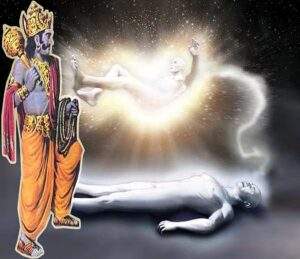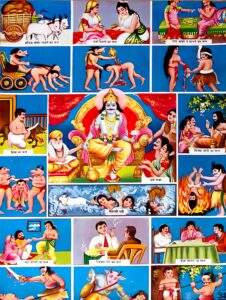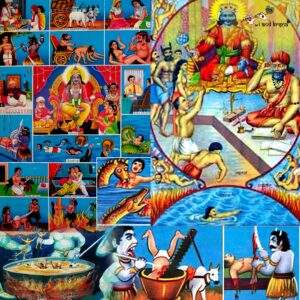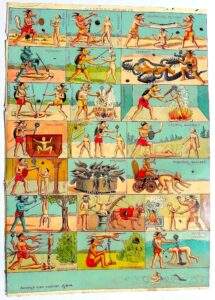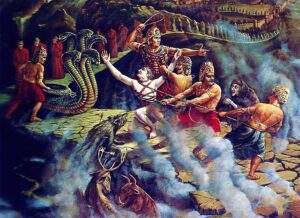- Reading the below scriptural content " with patience " helps you get more juice from these topics. -
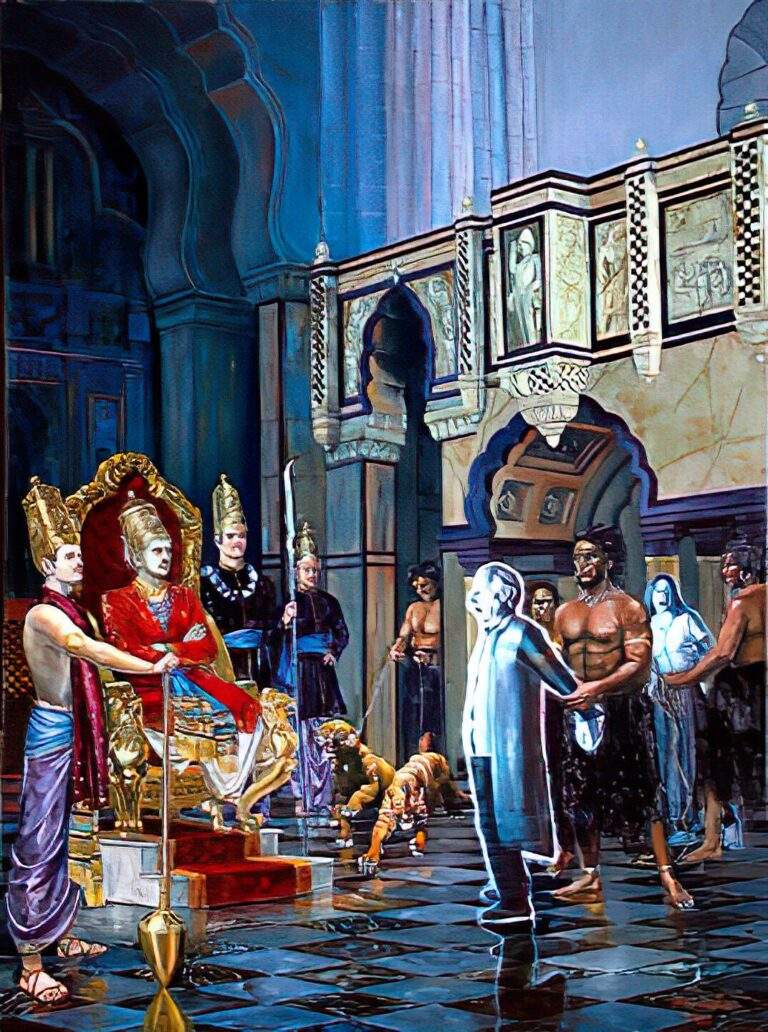
पुष्णाति येषां पोषेण शेषभुग्यात्यध: स्वयम् ॥ १० ॥
Naraka, as a whole, is known by many names conveying that it is the realm of Yama called Yamaloka.
Narak or Naraka – loka is also the abode of Yama, the god of Death. After death, the messengers of Yama called Yamadutas bring all beings to the court of Yamaraja, where he weighs the virtues and the vices of the living beings and accordingly passes the appropriate judgement.
Yamaraj, as Lord of Justice, is also called Dharma-raja. Yama sends the virtuous to Svarga-loka, the heavenly planets, to enjoy the luxuries of paradise. He also assesses the vices of the sinful and accords judgement, hell commensurate with the severity and nature of their sins.
The foolish person thinks he is independent of any law. He thinks there is no God or regulative principles and that he can do whatever he likes.
Thus he engages in different sinful activities, and as a result, he is put into different hellish conditions life after life, to be punished by the laws of nature.
The basic principle of his suffering is that he foolishly thinks himself independent, although he is strictly under the control of the laws of material nature.
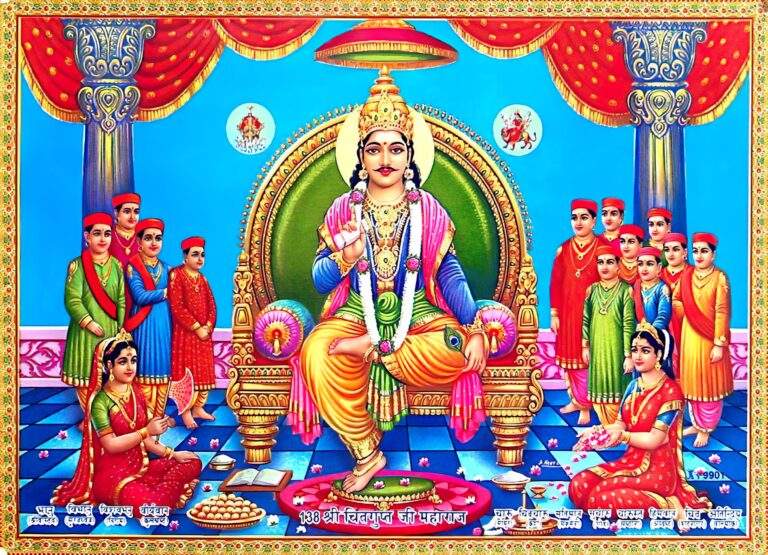
who is chitragupta ?
Yamaraja is aided by his minister Chitragupta, who maintains a record of all good and evil actions of every living being. Yama-dhutas are also assigned the job of executing the punishments on sinners in the various hells.
People who commit sins (पाप कर्म) goes to Hell and have to go through punishments in accordance with the sins they have committed. The god Yamarāja, who is also the god of death, presides over Hell.
Chitragupta reads out the sins committed by that individual and then Yama orders appropriate punishments to be given to those individuals.
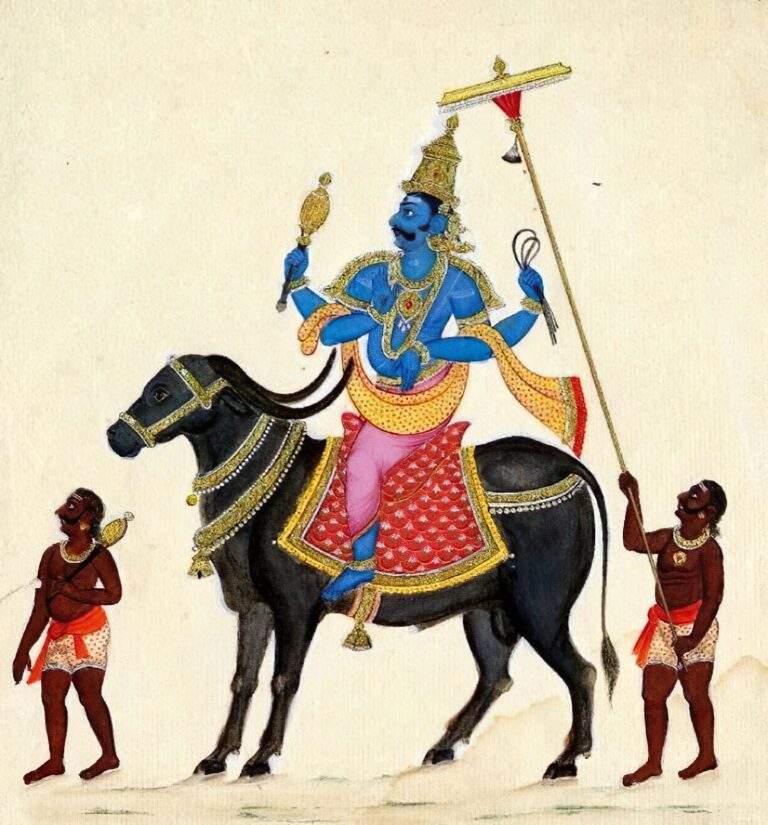
Yamarāja & Pitṛloka ?
The hellish planets are ruled by Yamarāja, the son of the sun-god. He resides in Pitṛloka with his personal assistants, performing his duty according to the rules and regulations laid down by the Supreme Lord.
The god of Death, Yama, employs Yama-dūtas (messengers of Yama), who bring souls of all beings to Yama for judgement.
In Yama’s court, Yamaraja roars loudly to the sinners, like clouds at the dissolution of the universe, threatening them with his black staff or club. He has 32 arms, his girth is 3 yojanas and he has curved fangs.
People dying in the holy places are also described as avoiding Yama. Those who get moksha (salvation) also escape from the clutches of yama- dūtas.
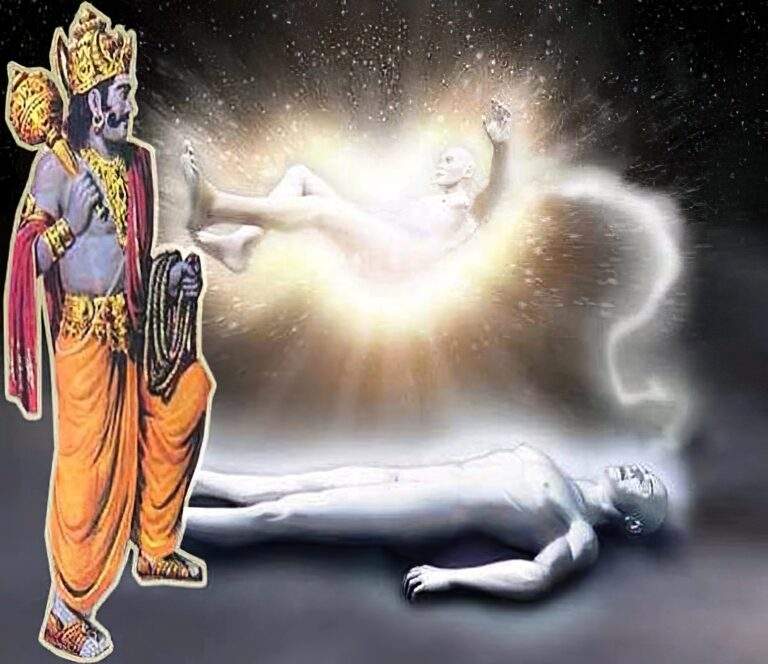
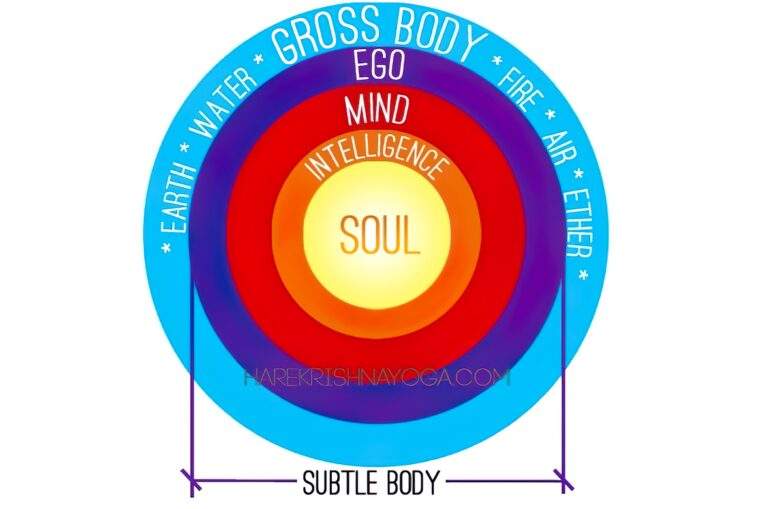
How does the sukshma (subtle) body go to hell ?
The subtle body of the soul going to hell is at the time of death, covered with a body suitable for punishment– yātanā-deha (subtle body) ( Srimad Bhāgavatam – 3.30.20 ), having the same shape as the previous gross body.
Every living entity is covered by a subtle and gross body. The subtle body is the covering of mind, ego, intelligence and consciousness. As mentioned in the scriptures, that the constables of Yamarāja cover the subtle body of the culprit ( sinful jiva ) and take him to the abode of Yamarāja to be punished in a way that he is able to tolerate.
While in the material world, if the person commits many sins, the subtle body will look very sinful, and the person will be forced to go to the different hells. At the time of death the gross body will be separated from the subtle body.
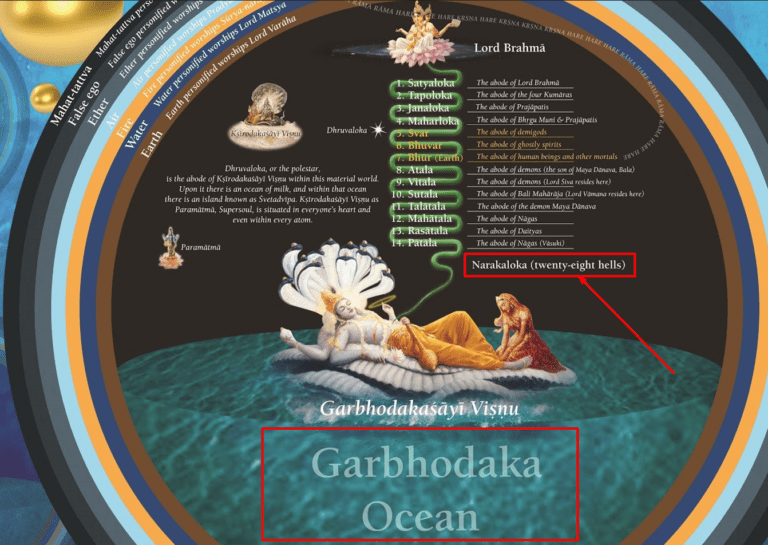
where are the hells located / and its distance ?
Srimad Bhagavatam describes Naraka as beneath the earth: between the 7 realms of the underworld (Patala) AND the Garbhodaka Ocean, which is the bottom of the universe.
Srimad Bhagavatam – 5.26.4 :
Srimad Bhagavatam – 5.26.5 :
According to the Srimad Bhagavatam, Canto 5 Chapter 24, hells are situated about 86,000 yojanas or 1,100,000 kilometers under the South Pole. ( A yojana can be considered to be about 8 miles or about 12 kms )
Hells are also described in various Puranas and other scriptures. Garuda Purana gives a detailed account of Hell, its features and enlists amount of punishment for most of the crimes like a modern day penal code.
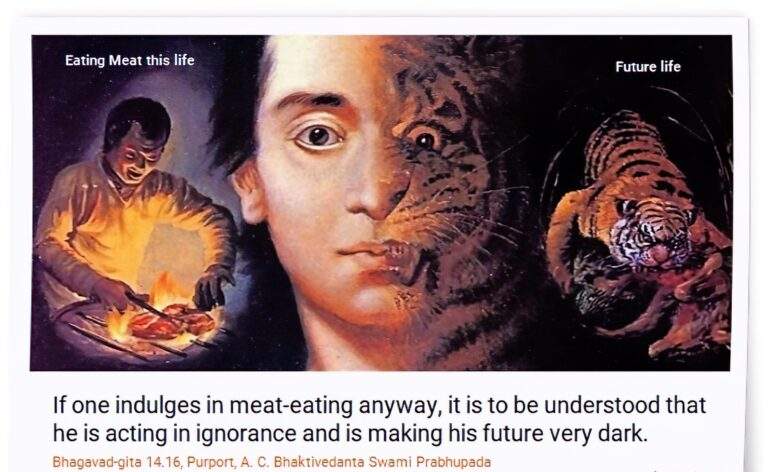
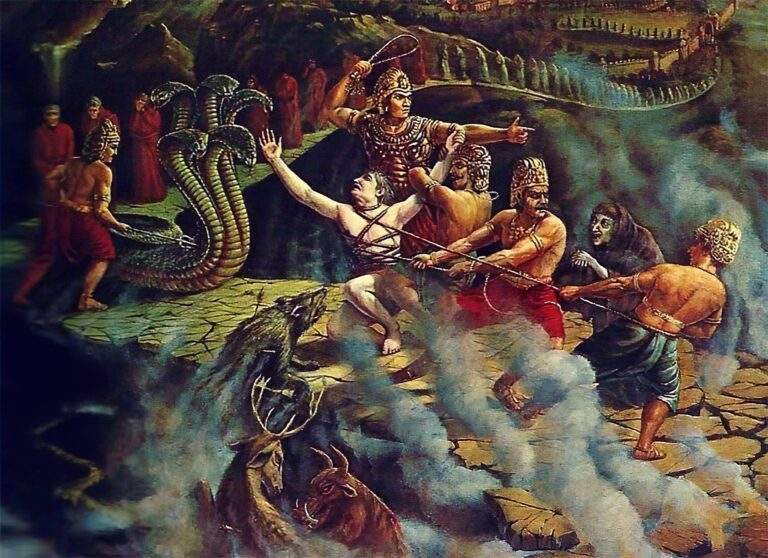
Process of punishments / on the way to the abode of yamaraja
After leaving the gross body and being in the hands of the Yamadutas, he is overwhelmed and trembles in their hands. While passing on the road he is bitten by dogs, and he can remember the sinful activities of his life. He is thus terribly distressed. ( Srimad Bhagatavam – ३.३०. २१ )
It appears from this verse that while passing from this planet to the planet of Yamarāja, the culprit ( sinful jiva ) arrested by Yamarāja’s constables meets many dogs, which bark and bite just to remind him of his criminal activities of sense gratification. It is said in Bhagavad-gītā that कामैस्तैस्तैर्हृतज्ञाना: [ Bhagavad Gita – 7.20] – One is bereft of all intelligence when he is too attracted by sense gratification ( satisfaction of their senses ), and he forgets that he has to suffer the consequences also.
While we live in the gross body, such activities of satisfaction of the senses are encouraged even by modern government regulations. In every state all over the world, such activities are encouraged by the government in the form of birth control. Women are supplied pills, and they are allowed to go to a clinical laboratory to get assistance for abortions.
Under the scorching sun,
- The criminal has to pass through roads of hot sand with forest fires on both sides.
- He is whipped on the back by the constables because of his inability to walk, and he is afflicted by hunger and thirst, but unfortunately there is no drinking water, no shelter and no place for rest on the road.
- While passing on that road to the abode of Yamarāja, he falls down in fatigue, and sometimes he becomes unconscious, but he is forced to rise again.
- In this way he is very quickly brought to the presence of Yamarāja. Thus he has to pass 99,000 yojanas within 2 or 3 moments, and then he is at once engaged in the torturous punishment which he is destined to suffer.
( Yojana is a Vedic measure of distance and 1 Yojana is approximately equals to around 12 kms )
He has to pass along a road which is therefore as much as 792,000 miles. Such a long distance is passed over within a few moments only.
To pass 792,000 miles within a few moments seems wonderful to the modern space travelers. They have so far traveled at a speed of 18,000 miles per hour, but here we see that a criminal passes 792,000 miles within a few seconds only, although the process is still not spiritual but material.
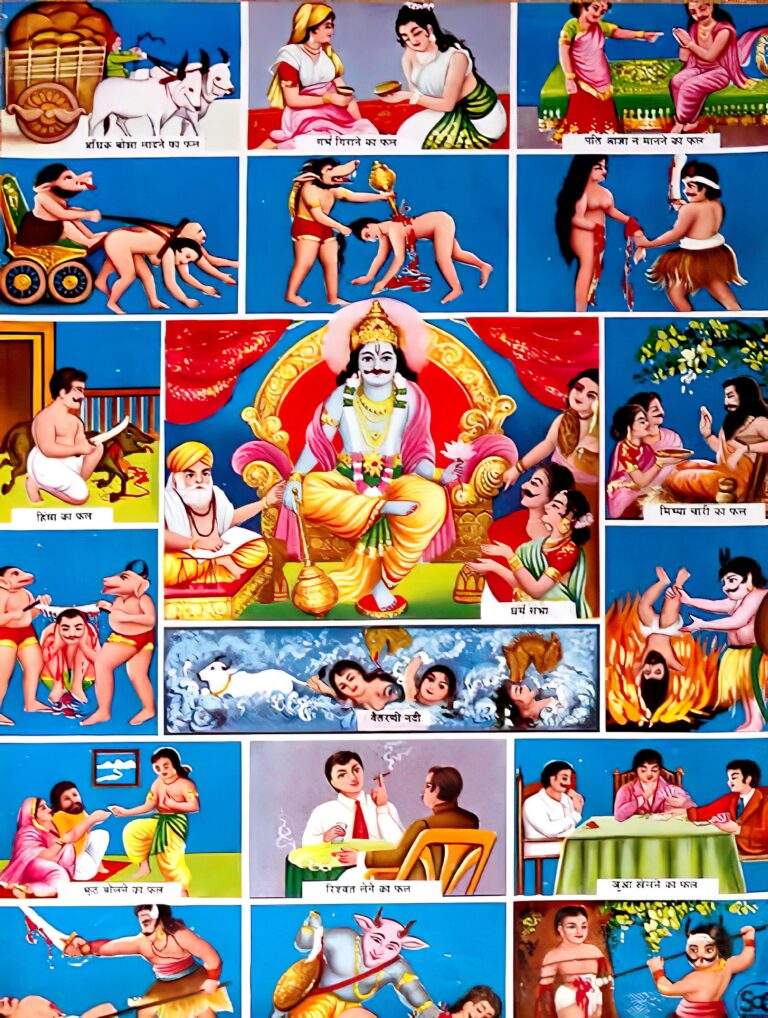
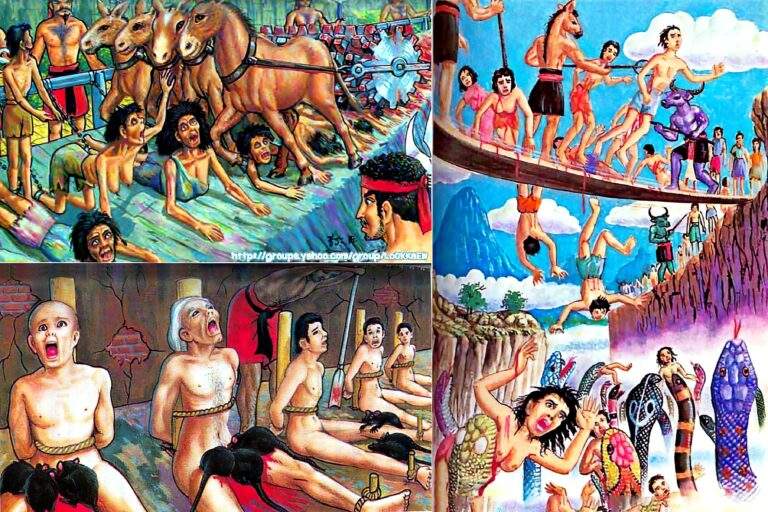
Vaitarani river
The river Vaitarani is 100 Yojanas wide, full of pus, blood, flesh, worms, crocodiles, and sharp weapons. The sinner is bitten by snakes, big scorpions, fishes and vultures while 12 suns are blazing (remeber: this is not the sun of our solar system) The sinner tries to swim over but sinks and has to vomit bitter water.
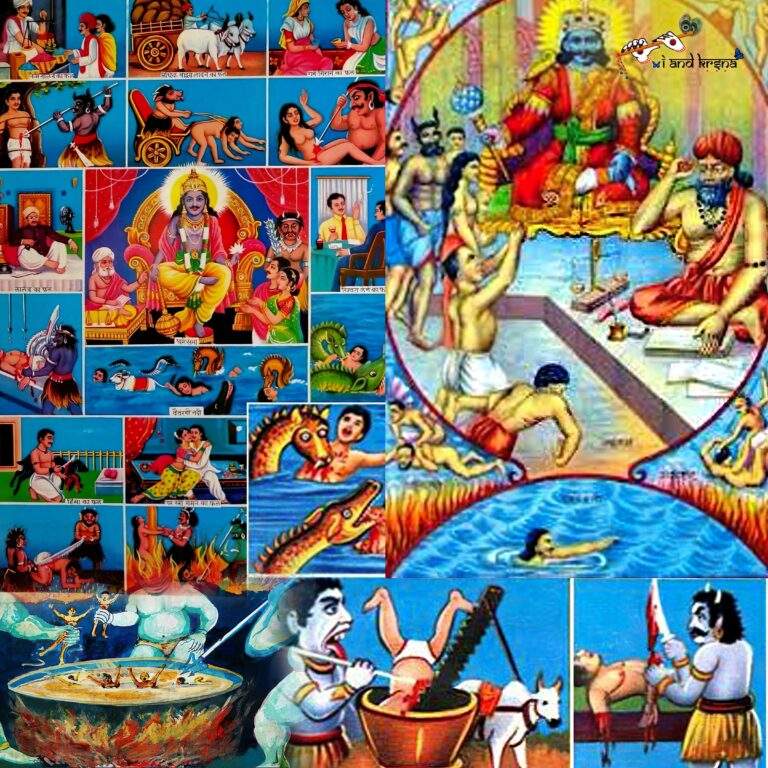
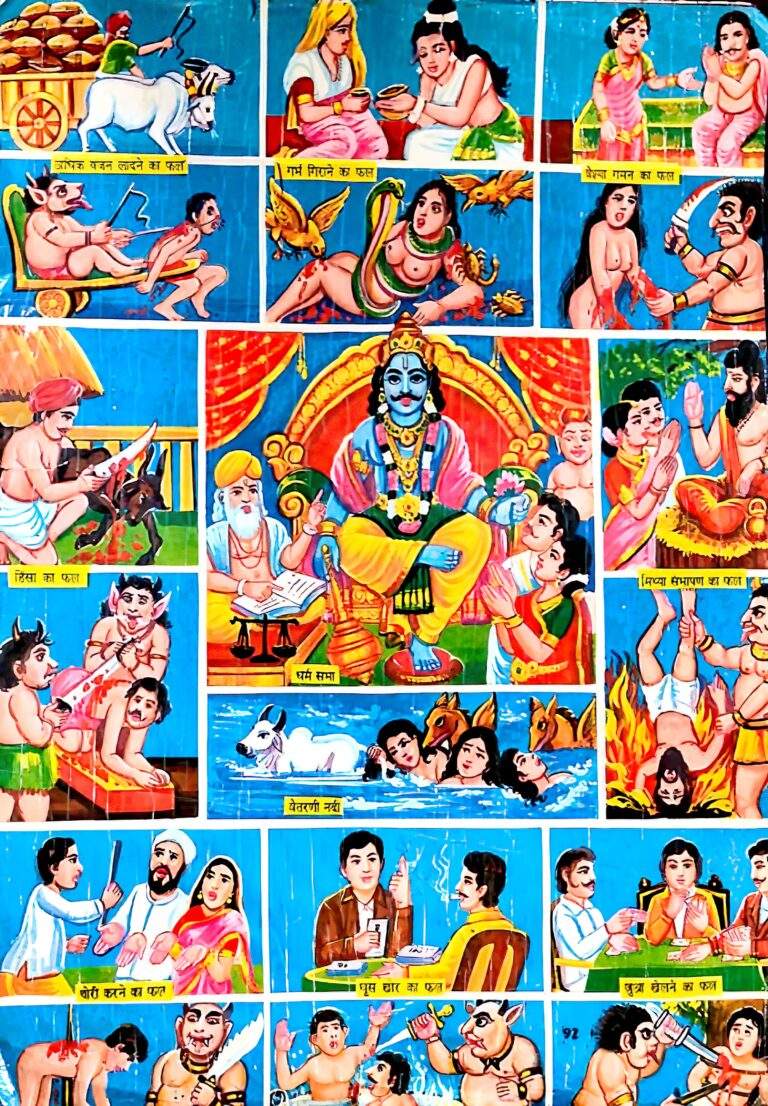
28 MAIN HELLS FROM THOSE THOUSANDS OF HELLS
Sukadeva Gosvāmī describes the following twenty-eight hells in Srimad Bhagavatam (5.26) :
1) Tāmisra
2) Andhatāmisra;
3) Andhatāmisra
4) Raurava
5) Mahāraurava
6) Kumbhīpāka
7) Kālasūtra
8) Asi-patravana
9) Andhakūpa
10) Kṛmibhojana
11) Sandaṁśa
12) Taptasūrmi
13) Vajrakaṇṭaka-śālmalī
14) Vaitaraṇī
15) Pūyoda
16) Prāṇarodha
17) Viśasana
18) Lālābhakṣa
19) Sārameyādana
20) Avīci
21) Ayaḥpāna
22) Kṣārakardama
23) Rakṣogaṇa-bhojana
24) Śūlaprota
25) Dandaśūka
28) Sūcīmukha
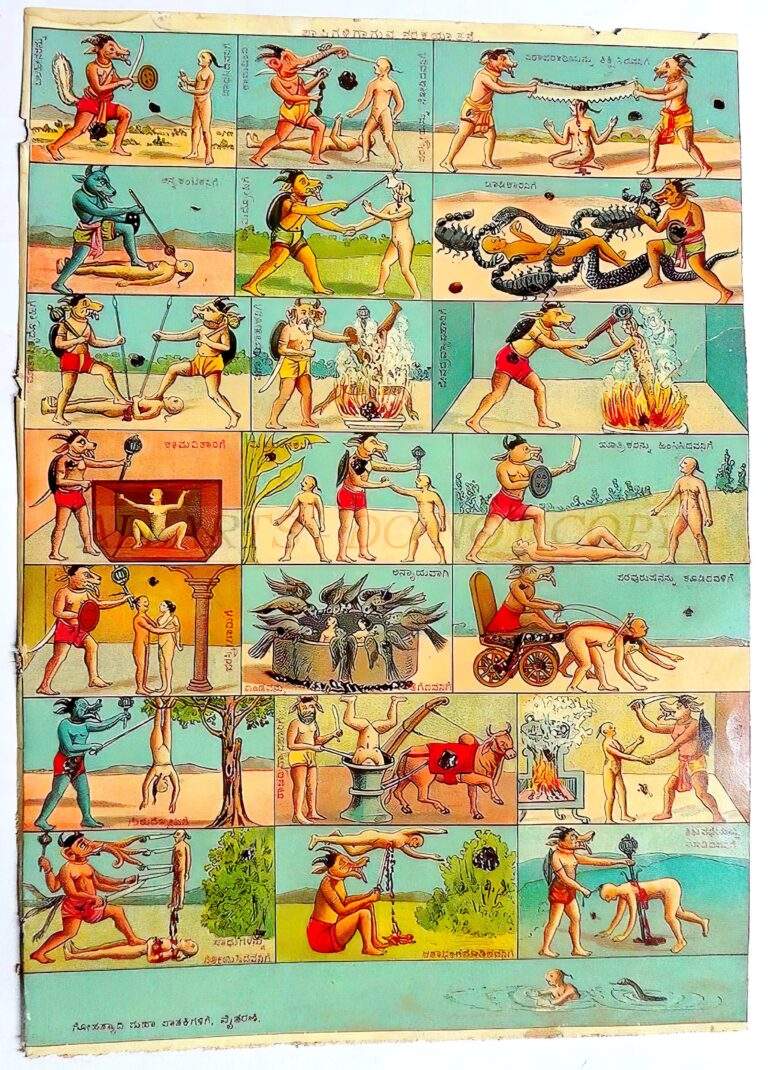
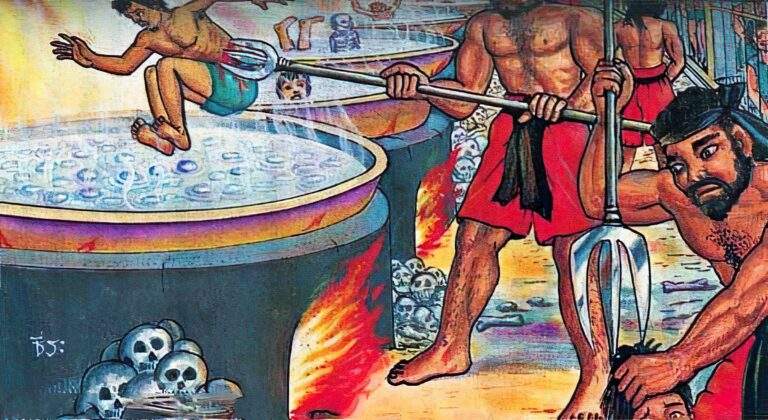
description of each hell from the 28 main hells
“Tāmisra:
My dear King,
A person who appropriates another’s legitimate wife, children or money is arrested at the time of death by the fierce Yamadūtas, who bind him with the rope of time and forcibly throw him into the hellish planet known as Tāmisra.
On this very dark planet, the sinful man is.
- Chastised by the Yamadūtas, who beat and rebuke him.
- He is starved, and he is given no water to drink.
- Thus the wrathful assistants of Yamarāja cause him severe suffering, and sometimes he faints from their chastisement. ( Srimad Bhagavatam – 5.26.8 )
Men and women whose lives were built upon indulgence in illicit sex life are put into many kinds of miserable conditions in the hells known as Tāmisra, Andha-tāmisra and Raurava. In the Vedic civilization sex life is allowed only in a restricted way; it is for the married couple and only for begetting children.
“Andhatāmisra :
The destination of a person who slyly cheats another man and enjoys his wife and children is the hell known as Andhatāmisra.
- There his condition is exactly like that of a tree being chopped at its roots.
- Even before reaching Andhatāmisra, the sinful living being is subjected to various extreme miseries.
- These afflictions are so severe that he loses his intelligence and sight. It is for this reason that learned sages call this hell Andhatāmisra, blinding darkness.
- After suffering there, when he who has had many types of hellish bodies, like those of dogs and hogs, is to come again to the human form, he is given the chance to take his birth in the same type of body from which he degraded himself to hell.
Atheists who destroy the world by exploiting the earth natural resources are also put into the Hell known as Andha-tāmisra. Atheist think that after death everything is finished, so they need not account their sinful life. ( Srimad Bhagavatam – 5.26.9 )
“Raurava :
In this life, an envious person commits violent acts against many living entities. Therefore after his death, when he is taken to hell by Yamarāja, those living entities who were hurt by him appear as animals called rurus to inflict very severe pain upon him.
- The person in the second class, however, not only thinks his material body to be his self, but also commits all kinds of sinful activities to maintain his body.
- He cheats everyone to acquire money for his family and his self, and he becomes envious of others without reason.
- Such a person is thrown into the hell known as Raurava.
If one needlessly commits sins to maintain his body, he is put into the hell known as Raurava. This is the opinion of Śrīla Viśvanātha Cakravartī Ṭhākura.
“Mahāraurava :
This Mahāraurava, or hell, is described in Śrīmad-Bhāgavatam as a place meant for persons who are engaged in killing animals, for it is stated there that butchers or animal eaters go to that hell.
Punishment in the hell called Mahāraurava is compulsory for a person who maintains his own body by hurting others. In this hell, ruru animals known as kravyādatorment him and eat his flesh.
The animalistic person who lives simply in the bodily concept of life is not excused. He is put into the hell known as Mahāraurava and attacked by ruru animals known as kravyādas. ( Srimad Bhagavatam – 5.26.12 )
“Kumbhīpāka :
Kumbhī means “pot,” and pāka means “boiling.”
So if a person were put into a pot of oil and the pot were set to boiling, he would have some idea of the suffering in Kumbhīpāka hell.
There he is put into boiling oil called kumbhī-pāka, from which there is no deliverance. For the maintenance of their bodies and the satisfaction of their tongues, cruel persons cook poor animals and birds alive. In their next lives they are carried by the Yamadūtas to the hell known as Kumbhīpāka, where they are cooked in boiling oil. ( Srimad Bhagavatam – 5.26.13 )
“Kālasūtra :
Heated from below by fire and from above by the scorching sun, the copper surface of this planet is extremely hot.
Therefore he
- sometimes lies down,
- sometimes sits,
- sometimes stands up and
- sometimes runs here and there.
He suffers in this way for as many thousands of years as there are hair on the body of an animal. ( Srimad Bhagavatam – 5.26.14 )
“Asi-patravana:
When he runs hither and thither, fleeing from the extreme pain, on all sides he runs into palm trees with leaves like sharpened swords.
In other words, a human being must follow the religious principles ( Srimad Bhagavatam – 5.26.15 )
“Sūkaramukha :
In his next life, a sinful king or governmental representative who punishes an innocent person, or who inflicts corporal punishment upon a brāhmaṇa, is taken by the Yamadūtas to the hell named Sūkaramukha, where the most powerful assistants of Yamarāja crush him exactly as one crushes sugarcane to squeeze out the juice.
The sinful living entity cries very pitiably and faints, just like an innocent man undergoing punishments. This is the result of punishing a faultless person.
( Srimad Bhagavatam – 5.26.16 )
“Andhakūpa :
By the arrangement of the Supreme Lord, low-grade living beings like bugs and mosquitoes suck the blood of human beings and other animals. Such insignificant creatures are unaware that their bites are painful to the human being.
The Supreme Lord punishes such a man by putting him into the hell known as Andhakūpa, where he is attacked by all the birds and beasts, reptiles, mosquitoes, lice, worms, flies, and any other creatures he tormented during his life.
They attack him from all sides, robbing him of the pleasure of sleep. Unable to rest, he constantly wanders about in the darkness. Thus in Andhakūpa his suffering is just like that of a creature in the lower species. ( Srimad Bhagavatam – 5.26.17 )
“Kṛmibhojana :
Any person who does not receive or feed a guest properly but who personally enjoys eating is put into the hell known as Kṛmibhojana.
There an unlimited number of worms and insects continuously bite him. A person is considered no better than a crow if after receiving some food, he does not divide it among guests, old men and children, but simply eats it himself, or if he eats it without performing the five kinds of sacrifice. After death he is put into the most abominable hell, known as Kṛmibhojana.
In that hell is a lake 100,000 yojanas [800,000 miles] wide and filled with worms. He becomes a worm in that lake and feeds on the other worms there, who also feed on him. Unless he atones for his actions before his death, such a sinful man remains in the hellish lake of Kṛmibhojana for as many years as there are yojanas in the width of the lake. ( Srimad Bhagavatam – 5.26.18 )
“Sandaṁśa :
My dear King, a person who in the absence of an emergency robs a brāhmaṇa—or, indeed, anyone else—of his gems and gold is put into a hell known as Sandaṁśa.
There his skin is torn and separated by red-hot iron balls and tongs. In this way, his entire body is cut to pieces. ( Srimad Bhagavatam – 5.26.19 )
“Taptasūrmi :
A man or woman who indulges in sexual intercourse with an unworthy member of the opposite sex is punished after death by the assistants of Yamarāja in the hell known as Taptasūrmi.
There such men and women are beaten with whips. The man is forced to embrace a red-hot iron form of a woman, and the woman is forced to embrace a similar form of a man. Such is the punishment for illicit sex. ( Srimad Bhagavatam – 5.26.20 )
“Vajrakaṇṭaka-śālmalī :
A person who indulges in sex indiscriminately – even with animals – is taken after death to the hell known as Vajrakaṇṭaka-śālmalī.
In this hell there is a silk-cotton tree full of thorns as strong as thunderbolts.
The agents of Yamarāja hang the sinful man on that tree and pull him down forcibly so that the thorns very severely tear his body. The sexual urge is so strong that sometimes a man indulges in sexual relations with a cow, or a woman indulges in sexual relations with a dog. Such men and women are put into the hell known as Vajrakaṇṭaka-śālmalī. From the description of these verses, we can understand what an extremely sinful act illicit sex is. ( Srimad Bhagavatam – 5.26.21 )
“Vaitaraṇī:
A person who is born into a responsible family – such as a kṣatriya, a member of royalty or a government servant—but who neglects to execute his prescribed duties according to religious principles, and who thus becomes degraded, falls down at the time of death into the river of hell known as Vaitaraṇī.
This river, which is a moat surrounding hell, is full of ferocious aquatic animals.
When a sinful man is thrown into the River Vaitaraṇī, the aquatic animals there immediately begin to eat him, but because of his extremely sinful life, he does not leave his body. He constantly remembers his sinful activities and suffers terribly in that river. ( Srimad Bhagavatam – 5.26.22 )
“Pūyoda :
One who lives like an animal is put into the hell called Pūyoda. The shameless husbands of lowborn śūdra women live exactly like animals, and therefore they have no good behavior, cleanliness or regulated life.
After death, such persons are thrown into the hell called Pūyoda, where they are put into an ocean filled with pus, stool, urine, mucus, saliva and similar things.
Śūdras who could not improve themselves fall into that ocean and are forced to eat those disgusting things. Thus there is always the chance that he may be put into the Pūyoda Naraka, the hell named Pūyoda, where one is forced to eat stool, urine, pus, mucus, saliva and other abominable things.
Thus even a born śūdra is expected to become a brāhmaṇa; that is the meaning of human life. Everyone should improve himself. ( Srimad Bhagavatam – 5.26.23 )
“Prāṇarodha :
A person who mercilessly kills animals in the forest without sanction is put into the hell called Prāṇarodha.
If in this life a man of the higher classes [brāhmaṇa, kṣatriya and vaiśya] is very fond of taking his pet dogs, mules or asses into the forest to hunt and kill animals unnecessarily, he is placed after death into the hell known as Prāṇarodha.
There the assistants of Yamarāja make him their targets and pierce him with arrows. ( Srimad Bhagavatam – 5.26.24 )
“Viśasana :
A person who kills animals in the name of religious sacrifice is put into the hell named Viśasana.
A person who in this life is proud of his eminent position, and who heedlessly sacrifices animals simply for material prestige, is put into the hell called Viśasana after death. There the assistants of Yamarāja kill him after giving him unlimited pain. ( Srimad Bhagavatam – 5.26.25 )
“Lālābhakṣa :
If a foolish member of the twice-born classes [brāhmaṇa, kṣatriya and vaiśya] forces his wife to drink his semen out of a lusty desire to keep her under control, he is put after death into the hell known as Lālābhakṣa.
There he is thrown into a flowing river of semen, which he is forced to drink. The practice of forcing one’s wife to drink one’s own semen is a black art practiced by extremely lusty persons. There he is immersed in the river known as Śukra-nadī and forced to drink semen. ( Srimad Bhagavatam – 5.26.26 )
“Sārameyādana :
One who sets a fire or administers poison to kill someone is put into the hell known as Sārameyādana.
In this world, some persons are professional plunderers who set fire to others’ houses or administer poison to them. Also, members of the royalty or government officials sometimes plunder mercantile men by forcing them to pay income tax and by other methods. After death such demons are put into the hell known as Sārameyādana.
On that planet there are 720 dogs with teeth as strong as thunderbolts. Under the orders of the agents of Yamarāja, these dogs voraciously devour such sinful people. Also government members who will impose unnecessary heavy taxes, especially on the mercantile community are described as dasyu, thieves.
“Avīci :
A man who earns his livelihood by bearing false witness is put into the hell known as Avīci.
A person who in this life bears false witness or lies while transacting business or giving charity is severely punished after death by the agents of Yamarāja.
Such a sinful man is taken to the top of a mountain eight hundred miles high and thrown headfirst into the hell known as Avīcimat. This hell has no shelter and is made of strong stone resembling the waves of water.
“Ayaḥpāna :
A person addicted to drinking wine is put into the hell named Ayaḥpāna.
Any brāhmaṇa or brāhmaṇa’s wife who drinks liquor is taken by the agents of Yamarāja to the hell known as Ayaḥpāna.
“Kṣārakardama :
A lowborn and abominable person who in this life becomes falsely proud, thinking “I am great,” and who thus fails to show proper respect to one more elevated than he by birth, austerity, education, behavior, caste or spiritual order, is like a dead man even in this lifetime, and after death he is thrown headfirst into the hell known as Kṣārakardama.
There he suffers great tribulation at the hands of the agents of Yamarāja. One should not become falsely proud.
“Rakṣogaṇa-bhojana:
A person who sacrifices human beings to Bhairava is put into the hell called Rakṣogaṇa-bhojana.
There are men and women in this world who sacrifice human beings to Bhairava or Bhadra Kālī and then eat their victims’ flesh.
“Śūlaprota :
A person who kills pet animals is put into the hell called Śūlaprota.
In this life some people give shelter to animals and birds that come to them for protection in the village or forest, and after making them believe that they will be protected, such people pierce them with lances or threads and play with them like toys, giving them great pain.
After death such people are brought by the assistants of Yamarāja to the hell known as Śūlaprota, where their bodies are pierced with sharp, needlelike lances. They suffer from hunger and thirst, and sharp-beaked birds such as vultures and herons come at them from all sides to tear at their bodies.
“Dandaśūka :
A person who gives trouble to others is put into the hell known as Dandaśūka.
Those who in this life are like envious serpents, always angry and giving pain to other living entities, fall after death into the hell known as Dandaśūka. My dear King, in this hell there are serpents with five or seven hoods. These serpents eat such sinful persons just as snakes eat mice. ( Srimad Bhagavatam – 5.26.33 )
“Paryāvartana :
A person who shows unwarranted wrath toward a guest in his house is put into the hell called Paryāvartana.
A householder who receives guests or visitors with cruel glances, as if to burn them to ashes, is put into the hell called Paryāvartana, where he is gazed at by hard-eyed vultures, herons, crows and similar birds, which suddenly swoop down and pluck out his eyes with great force.
According to the Vedic etiquette, even an enemy who comes to a householder’s home should be received in such a gentle way that he forgets that he has come to the home of an enemy. A guest who comes to one’s home should be received very politely.
The hell known as Paryāvartana, there many ferocious birds like vultures, crows, and coknis will suddenly come upon him and pluck out his eyes. ( Srimad Bhagavatam – 5.26.35 )
“Sūcīmukha :
A person maddened by possessing riches and thus deeply absorbed in thinking of how to collect money is put into the hell known as Sūcīmukha.
One who in this world or this life is very proud of his wealth always thinks, “I am so rich. Who can equal me?” His vision is twisted, and he is always afraid that someone will take his wealth.
Because of the sinful things he does to earn money, augment his wealth and protect it, he is put into the hell called Sūcīmukha, where the officials of Yamarāja punish him by stitching thread through his entire body like weavers manufacturing cloth. ( Srimad Bhagavatam – 5.26.36 )
Sukadeva Gosvāmī said to King Parikṣit: My dear King Parikṣit, in the province of Yamarāja there are hundreds and thousands of hellish planets. The impious people I have mentioned — and also those I have not mentioned — must all enter these various planets according to the degree of their impiety.
Those who are pious, however, enter other planetary systems, namely the planets of the demigods.
Nevertheless, both the pious and impious are again brought to earth after the results of their pious or impious acts are exhausted. ( until the time they are not getting the liberation / moksha )
( Srimad Bhagavatam – 5.26.37 )

